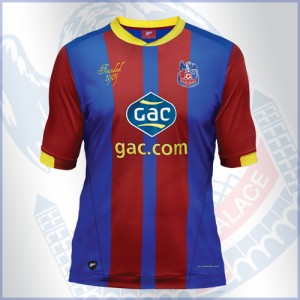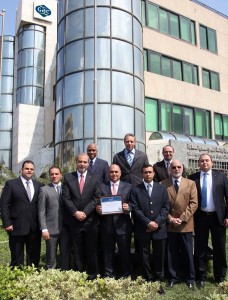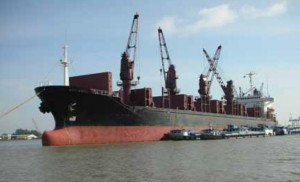Posted: May 29, 2013
“The cheers could be heard all the way from London to Athens, Dubai, Singapore, Cape Town, Sydney and throughout the GAC world last night when our sponsored team Crystal Palace beat Watford and won promotion to the Premier League.
It’s at times like this that we really feel the appeal of ‘The Beautiful Game’ and enormous pride that we have been the Club’s main sponsor since 2004.

For news of Crystal Palace and other teams and athletes we support, as well as the latest updates from the GAC Group, check out our pages on Facebook (www.facebook.com/GACgroup) and LinkedIn (www.linkedin.com/company/gac-group).”
GTSS combines the NMCI’s state-of-the-art facilities with GAC’s global reach and 50 years of shipping experience. http://www.nmci.ie/index.cfm/page/gtss
Sign Up to our Newsletter
Click Here
Posted: March 27, 2013
TRACE certification sends strong message for GAC Egypt
Underlines commitment to ethical business practice
Gulf Agency Company (Egypt) Ltd is the latest GAC company to become a member of anti-bribery body TRACE International, underlining its strong commitment to ethical corporate conduct.
“TRACE International, Inc. is a non-profit group that offers practical and cost-effective anti-bribery compliance solutions for multinational companies which are required to demonstrate transparent business practices regardless of pressure, local law or custom.
GAC Egypt’s certification comes after a stringent due diligence review of every aspect of its operations and key managers, highlighting the company as a beacon of compliance and stability.

The GAC Egypt Management Team with their TRACE certificate
Managing Director Capt. Mohammed Badawi (pictured, holding the certificate) says: “TRACE certification is yet another recognition of our integrity, a reflection of our transparency as well as an endorsement to our Code of Ethics.”
About GAC Group
GAC is a global provider of integrated shipping, logistics and marine services. Emphasising world-class performance, a long-term approach, innovation, ethics and a strong human touch, GAC delivers a flexible and value-adding portfolio to help customers achieve their strategic goals.
Established since 1956, GAC employs over 10,000 people in more than 300 offices worldwide.
Sign up for GAC’s free HOT PORT NEWS email for daily updates from ports around the world and RED HOT PORT NEWS for free SMS alerts of breaking news at www.gac.com/hpn.
Follow GAC Group on Facebook at www.facebook.com/GACGroup and LinkedIn at www.linkedin.com/company/gac-group”
http://www.allaboutshipping.co.uk/2013/03/21/trace-certification-sends-strong-message-for-gac-egypt/
Sign Up to our Newsletter
Click Here
Posted: February 27, 2012
In the latest edition of Dry Cargo International magazine, GAC’s ship agency operations are discussed as well as GTSS, the NMCI and the partnership with Brobulk. Read the full article below:

Ships’ agents prove their worth
GAC is a global provider of shipping, logistics and marine simulation training. As one of the world’s largest ship agencies, it has developed its business on a reputation for professionalism and quality service. As ships’ agent, GAC represents more than 3,500 customers and handles close to 60,000 vessels annually through a worldwide network of over 300 offices and a presence in over 40 countries. It is due to the breadth of services that it can offer worldwide that the GAC Group has the financial strength, experience and economies of scale to offer a one-stop solution to customers across the globe. In this article, GAC’s group sales director of shipping, Neil Godfrey, gives his insights into the company’s role in the ships’ agents market, and a view of the shipping industry in general.
As a ships’ agent, GAC offers an extensive portfolio of services related to both ship and cargo, which can be tailored to
meet each customer’s needs. These include: read more…
Sign Up to our Newsletter
Click Here
Posted: October 18, 2011
“Training too often seen as a ‘soft’ cost.’ The lastest article from Jeffrey Blum highlights the importance of training. Offshore training in particular is something we focus on here at the NMCI.
“The struggling dry bulk sector suffers from a basic lack of professional expertise that can generate serious problems. The cause and solution are straightforward, argues Jeffrey Blum.
Perhaps the most striking difference between the dry bulk sector today and a decade ago is the increasing dominance of the market by large companies.
In itself, this is not a problem but the industry has been navigating tough times for a number of years and, as a result, training is often high on the list of immediate cost cutting opportunities. This is short sighted.
The size of a company does not necessarily dictate a level of professionalism, expertise or commitment to quality training within it. Because of their size and scale, too many believe they can rely upon internal expertise to train others – an approach that is more often than not ineffective.To avoid the mistakes of one generation being passed down to the next, these organisations need more thorough and standardised training than current internal processes provide. The sector is already struggling with self professed experts disseminating their ‘knowledge’ and, by doing so, simply extending their own operational ineffeciencies.
The proof of these problems lands on arbitrators’ desks every day. Of the disputes I come across, too many stem from a basic lack of knowledge and understanding.
Commonly these disputes are about demurrage calculations, but the subject of the dispute is secondary to its underlying cause: a lack of training in how to carry out these processes appropriately. read more…
Sign Up to our Newsletter
Click Here
Posted: August 23, 2011
Training companies Seagull and Videotel have developed new programs covering the regulatory changes on solid bulk cargoes. New rules on the loading, discharge and transportation of cargoes such as coal and iron in bulk carriers became mandatory under Solas from the beginning of this year. The regulatory changes, made through the International Maritime Solid Bulk Cargoes (IMSBC) code, replace the Code of Safe Practice for Solid Bulk Cargoes (BC Code); they have to be followed by all bulk carriers.
Seagull’s computer based training (CBT) module introduces best practices and sets out optimum safety measures for the loading, discharge and carriage of solid bulk cargoes, as set out under the IMSBC code. It incorporates 12 chapters dealing with different aspects of the new code and is aimed particularly at seafarers of Standards of Training Certification and Watchkeeping STCW Management and operation level who are involved with cargo operations.
“This is also a very useful tool for management at the shore-based offices of owners and operators, since it can give staff in these locations a very detailed view of the issues involved in loading, discharging and transporting these types of cargoes,” says Jim Dibble, managing director of Seagull’s maritime IT subsidiary.
Seagull’s CBT module outlines the correct procedures and methods for stowage of solid bulk cargoes and the compatibility of different ones, with aspects relating to ship and crew safety, and environmental protection. It covers the precautions required for transporting dangerous cargoes, including those that are liable to self heat, and combust; how to maintain the structural stability of a ship by eliminating stresses on bulkheads and other components; and how to ensure the safety of onboard personnel.
Taking about two hours to complete, Seagull’s IMSBC Code module gives practical examples of real situations that have occurred on bulkers in the past, says Capt Dibble. “We have illustrated the dangers of non-compliance with actual accidents or incidents that have occurred within the industry,” he explains. “Introducing real scenarios helps focus the minds of seafarers on the task in hand, which will ensure the safety of themselves and their colleagues, as well as the safety of the vessel itself.”
There are assessments at the end of each chapter to provide trainees feedback on the level of understanding they have reached. The results of these can be examined by a company’s training administrators, via databases, so that they can keep track of trainee progress and the level of comprehension that has been achieved.
To sign up to our newsletter click here – http://www.nmci.ie/newsletter-signup
Sign Up to our Newsletter
Click Here




Connect with NMCIS